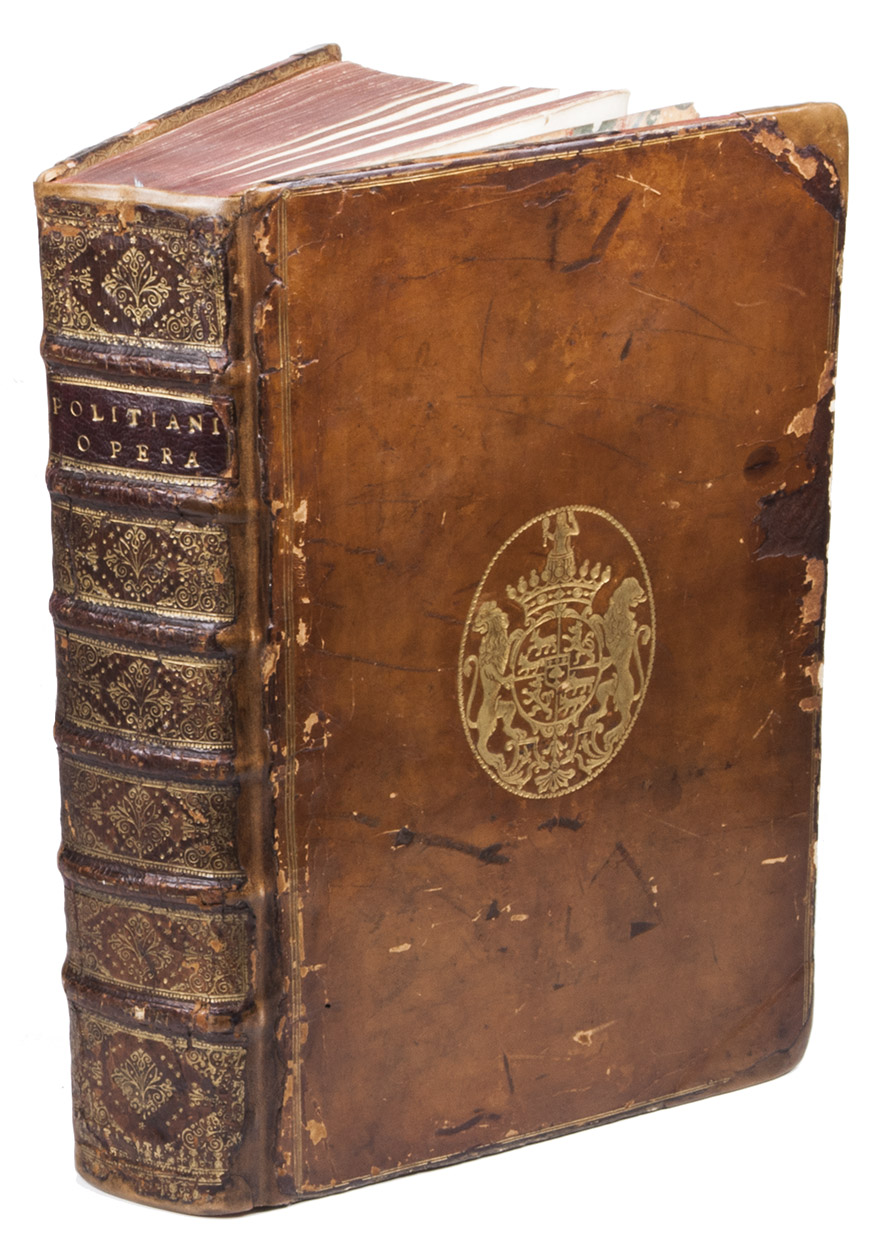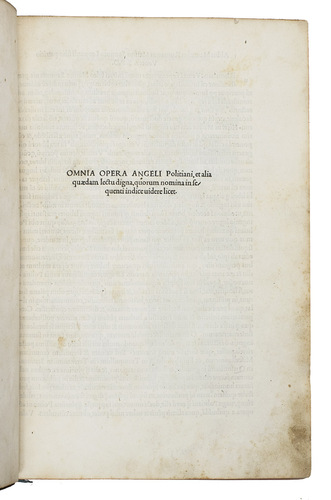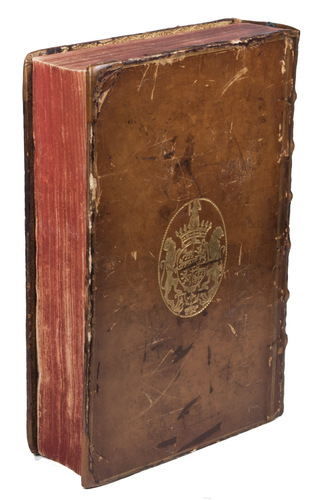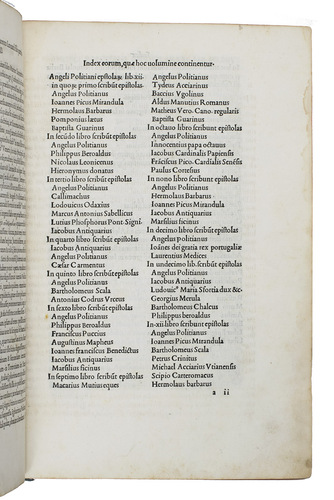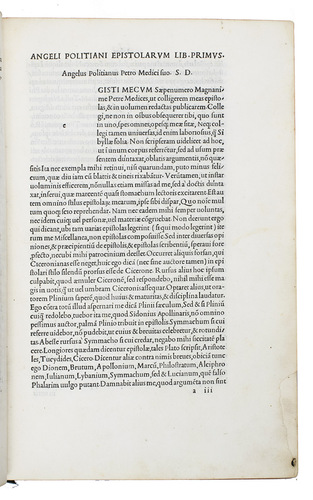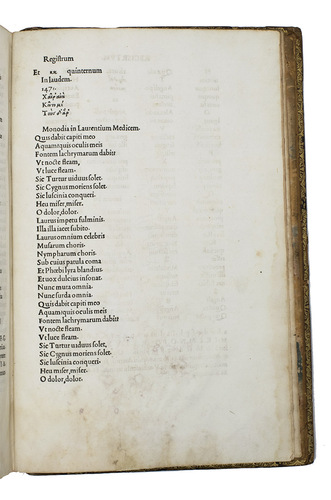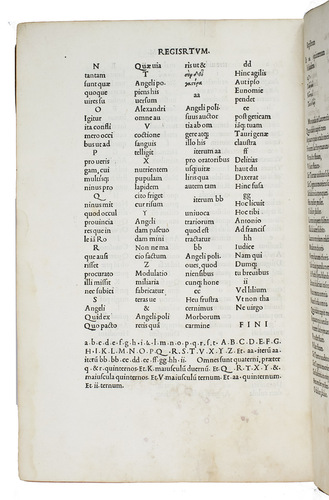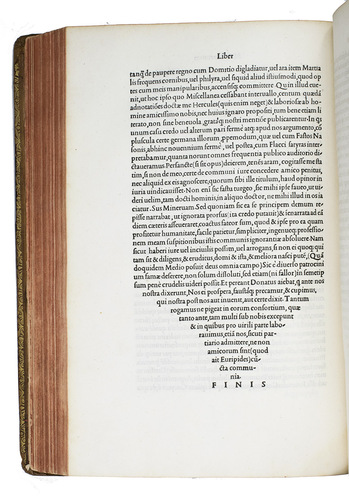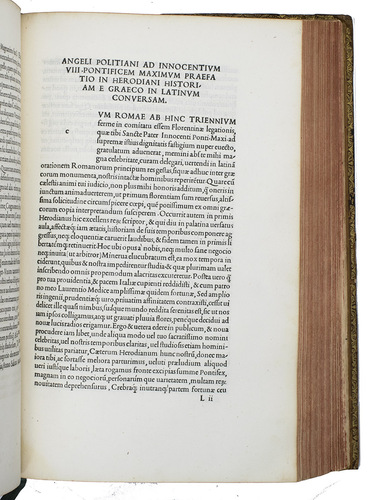POLIZIANO, Angelo.
Omnia opera Angeli Politiani, et alia quaedam lectu digna, quorum nomina in sequenti indice vedere licet.
Venice, Aldus Manutius, 1498. Folio. Early 18th-century (?) polished calf, spine richly gilt in compartments with red morocco title label, both sides with triple gilt fillets along the edges and large gilt oval coat-of-arms in the centre, inner dentelles, marbled endpapers. The coat of arms is of Henri-Louis Loménie, comte de Brienne (1658-1743), son of Louis Henry Loménie de Brienne. [452] ll.
€ 55,000
The Opera omnia of Angelo Poliziano (1454-1494), one of the great Florentine humanists and tutor to Lorenzo de 'Medici's children, printed by the most famous printer and publisher of its time: Aldus Manutius at Venice. According to Renouard, the great bibliographer of the Aldine editions, this rare edition is "l'une des plus belles qui soient sorties de l'imprimerie Aldine".
The publication of the Opera omnia of Poliziano has a complex history. It has been usual to regard the edition as part of some 'grand design' of humanist publication: apart from Aldus' admiration for Poliziano as the embodiment of that perfect philological skill to which he himself aspired, we might notice that the book was printed as a large folio, costing 1.4 ducats and demanding typographic experiments such as the first use of Hebrew letters (Lowry).
Indeed Poliziano was the outstanding humanist of his day, a talented scholar whose breadth of reading was very great and whose range of interests included history, politics, jurisprudence, architecture, botany, and even cooking. These interests were accompanied by a remarkable ability to handle Greek, in which language Poliziano composed many epigrams. His influence on the subsequent course of humanism was considerable. He may be considered the father of textual criticism, for he was the first to consider carefully the relationship between manuscripts and to stress the need to reconstruct the original text. He brought all these talents to bear on thorny textual and interpretative questions in texts like his Miscellanea (1489) and his commentary of the Pandects. He also translated many Greek texts into Latin such as the Manual of Epictetus and a number of books of the Ilias. His own poetical output reflects his scholarly eclecticism: he wrote in an erudite style, displaying his own considerable reading.
Poliziano was a celebrity in his day. Among those who idolized him was the young Aldus Manutius who decided to publish Poliziano's complete works in the late '90s. After Poliziano's death in 1494 the humanist Pico della Mirandola started a project to organize Poliziano's papers to the end of publishing an edition of his collected works, which eventually became our edition published by Aldus and edited by Alessandro Sarti.
Our copy has an interesting provenance: (1) the gilt coat-of-arms on both covers is of the bibliophile Henri-Louis de Loménie, comte de Brienne, born in 1658, married in 1689 to Jacqueline-Charlotte Brulart and died at Paris in 1743, after having sold his father's library in London in 1724 (E. Olivier, a.o., Manuel de l'amateur de reliures armoriées françaises, Dixième sér, Pl. 1077, nr. 4 (stamped on a binding of a work of 1707).
The bookplate of "The Paolino Gerli Collection, Manhattan College, The City of New York" is pasted to the back of the front cover. Also with some annotations in a humanistic hand; margin of title somewhat soiled, minor mouldy stains at the bottom of the last leaves, rebacked spine. Excellent copy with wide margins and complete with the blank f. K4 of one of the finest Aldines. Aldo Manuzio e l'ambiente Venet. 25; Aldus Manuzio editore XV; In aedibus Aldi 34; BMC V, 559; Goff P-886; IDL 3758; IGI 7952; Lowry, p. 113, 118, 135; Pellechet/Polain 9460; Polain 3233; Renouard 1498, p. 17, nr. 4; Sheehan, Vaticana P-429; Walsh, Harvard 266-70.
Related Subjects:
